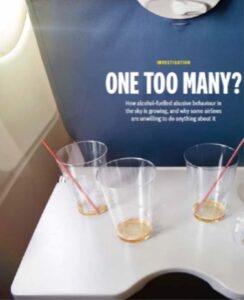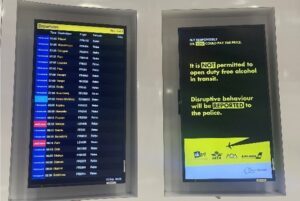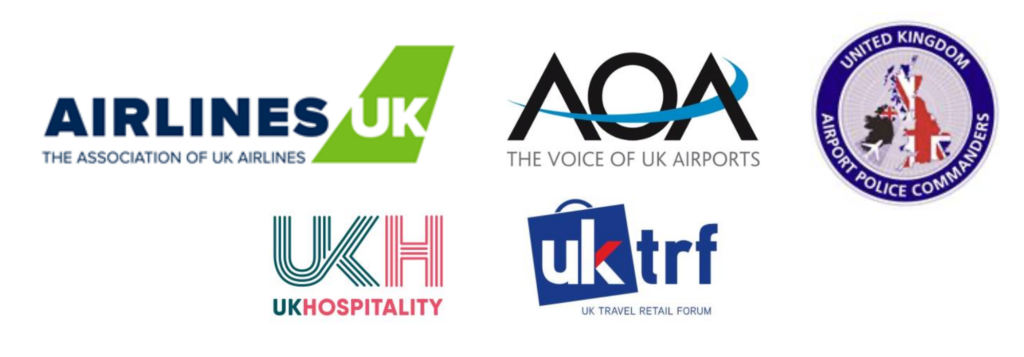Disruptive Passengers - One Too Many Campaign
The One Too Many campaign is a cross-industry campaign led by the UK Travel Retail Forum (UKTRF), the Airport Operators Association (AOA), Airlines UK and the International Air Transport Association (IATA). It was launched in 2018 and promotes the personal and legal consequences of disruptive behaviour at airports.
Only 1 in every 640,000 passengers are disruptive – however, this is still one passenger too many. While incidents are rare, they can have a significant impact for fellow passengers and employees working airside, landside and onboard. The One Too Many campaign emphasises personal accountability and encourage passengers to fly responsibly, because there are serious consequences if they do not, such as:
- Being denied boarding and missing your holiday
- Facing up to 2 years in jail for disruption a flight
- A £5,000 fine for delaying a flight from taking off
- A £80,000 diversion fee if you cause a mid-air incident
- An airline ban, if you cause a flight to be cancelled

The campaign utilises a combination of in store signage (printed and on-screen), social media assets, media activation and industry awareness. Through its partners’ respective memberships, it is in place at most major UK airports: including Manchester, London Heathrow, London Gatwick, Birmingham, Newcastle International, Bristol and Liverpool John Lennon. Airside retailers and food and beverage outlets, such as World Duty Free and JD Wetherspoons, are also key participants.

Though there are many causes for disruptive behaviour (compliance with mask wearing requirements being a major cause during the Covid-19 pandemic), incidents that arise as a result of alcohol consumption are not confined to airports or air travel – it is an issue that must be addressed across society.
The aviation industry takes these incidents very seriously. All bars and retail outlets operating in airports around the UK follow the same policies and practices as their high street counterparts. Staff receive the same training and guidance to responsibly serve and sell alcohol to passengers as they would in a licensed premises.
In a showing of the industry’s commitment to safety airside, UK airports, airlines, retailers and hospitality operators have joined forces to develop the UK Aviation Industry Code of Practice on Disruptive Passengers.

The purpose of the code is to create a common, consistent approach that co-ordinates and enhances existing efforts to prevent and minimise disruptive passenger behaviour. It promotes:
- A zero-tolerance approach to disruptive behaviour
- The identification, pre-emption, management and reporting of disruptive incidents
- The responsible sale and consumption of alcohol; and
- Education and communication with passengers.
The One Too Many campaign reinforces the code’s message, and compliments the many other initiatives individual airports and airside retailers have in place.


One Too Many Campaign Brief

The UK Aviation Industry Code of Practice on Disruptive Passengers
The UK has one of largest, most vibrant and competitive aviation markets in the world. More than 251 million passengers passed through UK airports in 2015 and there were over 2.1 million flights. The vast majority of passengers reach their destination having had a safe and enjoyable journey. However, a small minority of passengers behave in a disruptive manner, causing problems at the airport and on- board aircraft.
While disruptive behaviour remains rare, when it does happen the impact can be significant – for fellow passengers, employees working at the airport and in the air, as well as for the disruptive passengers themselves. The results can be nuisance and annoyance at one end of the scale, to threats to passengers, crew and aircraft safety at the other. These incidents can be costly and cause delays.
Disruptive incidents occur for different reasons and take different forms. Internal airline data suggests that excessive and uncontrolled alcohol consumption is a common factor, but it is not the only factor. Whatever the cause, disruptive behaviour on-board an aircraft is illegal and the worst cases can result in fines, travel bans and custodial sentences.
In the summer of 2015, airlines, airports, the police, the CAA, government officials and a major airport retailer met to consider the problem. It was clear from the discussion that there are many examples of good practice – both within individual businesses and across the sector at certain locations – but there is not a co-ordinated national approach to the issue. This means that passengers do not receive consistent messaging and good practice is not widely shared.
This voluntary code of practice has been developed by members of Airlines UK, the Airport Operators Association, the Airport Police Commanders Group, the Association of Licensed Multiple Retailers and the UK Travel Retail Forum. The purpose of the Code is to create a common, consistent approach that co-ordinates and enhances existing efforts to prevent and minimise disruptive passenger behaviour.
Signatories to the Code participate voluntarily because they are committed to ensuring passengers have a consistently safe and enjoyable experience when flying for work or leisure, and to providing a safe and pleasant work environment for their employees. The Code will be kept under review and updated periodically to ensure it remains relevant, proportionate and effective. The Code does not alter any existing legal obligations on any signatories.
Our Principles
There are some clear principles that underpin this Code.
All passengers are responsible and accountable for their own behaviour.
Disruptive behaviour cannot and will not be tolerated.
Reducing disruptive behaviour is a shared responsibility of all partners on the ground and in the air.
Our Commitments
Signatories to this Code commit to working together to prevent and minimise the number of disruptive passenger incidents. These commitments cover:
our approach to disruptive behaviour;
supporting employees;
the sale and consumption of alcohol; and
educating and communicating with passengers.
The Code
Signatories to this Code take a zero-tolerance approach to disruptive behaviour.
All signatories seek to pre-empt disruptive behaviour so that potential incidents are avoided.
All signatories will communicate incidents of disruptive behaviour in the airport to relevant partners where it may help to prevent or manage further disruptive behaviour.
Airlines, airports, bars, restaurants and retailers will report incidents of disruptive behaviour to the police and support any resulting police action.
The police will support airlines, airports, bars, restaurants and retailers to improve the reporting of incidents.
The police will investigate all reported incidents, including those flights where foreign police forces have refused to deal with or have not been made aware of an outbound disruptive passenger.
The police will take action that is appropriate to the incident, including seeking prosecutions or pushing for compensation orders on behalf of the airline for diversions, damage to aircraft, and delays.
Airlines will deny boarding where necessary to protect fellow passengers and crew from disruptive behaviour.
Airlines will seek to hold passengers who are disruptive to account for their behaviour. This will include recouping from passengers the costs resulting from their disruptive behaviour, including for diversions, damage to aircraft, and delays, and implementing bans on future travel.
Airlines will work with their trade associations and regulators to ensure the reporting and data collection of incidents is consistent so that progress in reducing incidents can be measured.
Airports shall discuss disruptive passenger issues in airport forums, including, for example, with airports, airlines, retailers, bars and restaurants and the Police and other relevant parties, to seek to ensure that the spirit of the code of conduct is upheld and issues addressed.
Airports will seek to prevent the consumption of any alcohol that is brought into the airport, alcohol that is purchased at off-sales premises within the terminal and alcohol that is purchased at duty free shops.
Signatories to this Code will train, empower and support their staff to identify, pre-empt, de-escalate and manage disruptive passenger behaviour.
All signatories will provide the necessary procedures, guidance, tools, training and post- incident support for their employees.
All signatories will provide input into the training provided by each signatory if requested.
The police will respond to requests for assistance from airline, airport, bar, restaurant and retailer employees dealing with a disruptive passenger incident.
Signatories to this Code will practice the responsible and controlled selling or supplying of alcohol and encourage the responsible consumption of alcohol by passengers.
Airlines, bars, lounges, restaurants and retailers will train their staff to practice the responsible selling of alcohol, including limiting or stopping the sale/supply of alcohol to prevent or manage disruptive behaviour.
Airports will seek to ensure that their bars, lounges and restaurants follow best practice when selling or supplying alcohol, and will encourage parties to sign up to the code. Alongside other partners and operators, this could include the establishment or continuation of a Best Bar None scheme or equivalent scheme. Airports will encourage their bars, lounges and restaurants to gain accreditation.
Airlines, bars, lounges, restaurants and retailers will not sell or supply alcohol to a person who they believe to be intoxicated or encourage excessive alcohol consumption.
Retailers will advise passengers not to open and consume alcohol before or during their flight.
Airlines will advise passengers that they may limit or stop the sale or serving of alcohol, and that only alcohol sold or served on-board the aircraft should be consumed.
Airlines will take steps to prevent the consumption of alcohol not sold or served on-board. This could include pre-boarding and on-board announcements, storing duty free purchases in a separate location during the flight, and the use of sealed tamper proof bags.
Airlines, bars, lounges, restaurants and retailers will ensure that their staff co-operate with the police:
when requiring written statements of evidence in relation to an investigation; and
when requiring entry to the premises in order to conduct a routine visit.
Bars, lounges and restaurants will have a Designated Premises Supervisor (DPS) responsible for selling or supplying alcohol. The DPS should be in day-to-day control of the establishment and if not contactable, a nominated senior member of staff will be responsible on each shift. The DPS will also represent the retailer at the airport’s disruptive passenger forum.
Bars, lounges and restaurants will maintain a record of their DPS and nominated persons, disruptive incidents and refused sales or service and staff training records that is available for inspection on visits to premises by the police.
Signatories to this Code will individually and collectively:
promote responsible and considerate behaviour among air passengers;
communicate to passengers what disruptive behaviour is and why it is unacceptable;
educate passengers about the specific law around behaviour on-board aircraft and the negative implications and penalties that can result from disruptive behaviour; and
educate passengers about the industry standards around the consumption of alcohol on-board aircraft.
1) Our approach to disruptive behaviour
Signatories to this Code take a zero-tolerance approach to disruptive behaviour.
All signatories seek to pre-empt disruptive behaviour so that potential incidents are avoided.
All signatories will communicate incidents of disruptive behaviour in the airport to relevant partners where it may help to prevent or manage further disruptive behaviour.
Airlines, airports, bars, restaurants and retailers will report incidents of disruptive behaviour to the police and support any resulting police action.
The police will support airlines, airports, bars, restaurants and retailers to improve the reporting of incidents.
The police will investigate all reported incidents, including those flights where foreign police forces have refused to deal with or have not been made aware of an outbound disruptive passenger.
The police will take action that is appropriate to the incident, including seeking prosecutions or pushing for compensation orders on behalf of the airline for diversions, damage to aircraft, and delays.
Airlines will deny boarding where necessary to protect fellow passengers and crew from disruptive behaviour.
Airlines will seek to hold passengers who are disruptive to account for their behaviour. This will include recouping from passengers the costs resulting from their disruptive behaviour, including for diversions, damage to aircraft, and delays, and implementing bans on future travel.
Airlines will work with their trade associations and regulators to ensure the reporting and data collection of incidents is consistent so that progress in reducing incidents can be measured.
Airports shall discuss disruptive passenger issues in airport forums, including, for example, with airports, airlines, retailers, bars and restaurants and the Police and other relevant parties, to seek to ensure that the spirit of the code of conduct is upheld and issues addressed.
Airports will seek to prevent the consumption of any alcohol that is brought into the airport, alcohol that is purchased at off-sales premises within the terminal and alcohol that is purchased at duty free shops.
2) Supporting employees
Signatories to this Code will train, empower and support their staff to identify, pre-empt, de-escalate and manage disruptive passenger behaviour.
All signatories will provide the necessary procedures, guidance, tools, training and post- incident support for their employees.
All signatories will provide input into the training provided by each signatory if requested.
The police will respond to requests for assistance from airline, airport, bar, restaurant and retailer employees dealing with a disruptive passenger incident.
3) The sale and consumption of alcohol
Signatories to this Code will practice the responsible and controlled selling or supplying of alcohol and encourage the responsible consumption of alcohol by passengers.
Airlines, bars, lounges, restaurants and retailers will train their staff to practice the responsible selling of alcohol, including limiting or stopping the sale/supply of alcohol to prevent or manage disruptive behaviour.
Airports will seek to ensure that their bars, lounges and restaurants follow best practice when selling or supplying alcohol, and will encourage parties to sign up to the code. Alongside other partners and operators, this could include the establishment or continuation of a Best Bar None scheme or equivalent scheme. Airports will encourage their bars, lounges and restaurants to gain accreditation.
Airlines, bars, lounges, restaurants and retailers will not sell or supply alcohol to a person who they believe to be intoxicated or encourage excessive alcohol consumption.
Retailers will advise passengers not to open and consume alcohol before or during their flight.
Airlines will advise passengers that they may limit or stop the sale or serving of alcohol, and that only alcohol sold or served on-board the aircraft should be consumed.
Airlines will take steps to prevent the consumption of alcohol not sold or served on-board. This could include pre-boarding and on-board announcements, storing duty free purchases in a separate location during the flight, and the use of sealed tamper proof bags.
Airlines, bars, lounges, restaurants and retailers will ensure that their staff co-operate with the police:
when requiring written statements of evidence in relation to an investigation; and
when requiring entry to the premises in order to conduct a routine visit.
Bars, lounges and restaurants will have a Designated Premises Supervisor (DPS) responsible for selling or supplying alcohol. The DPS should be in day-to-day control of the establishment and if not contactable, a nominated senior member of staff will be responsible on each shift. The DPS will also represent the retailer at the airport’s disruptive passenger forum.
Bars, lounges and restaurants will maintain a record of their DPS and nominated persons, disruptive incidents and refused sales or service and staff training records that is available for inspection on visits to premises by the police.
4) Educating and communicating with passengers
Signatories to this Code will individually and collectively:
promote responsible and considerate behaviour among air passengers;
communicate to passengers what disruptive behaviour is and why it is unacceptable;
educate passengers about the specific law around behaviour on-board aircraft and the negative implications and penalties that can result from disruptive behaviour; and
educate passengers about the industry standards around the consumption of alcohol on-board aircraft.